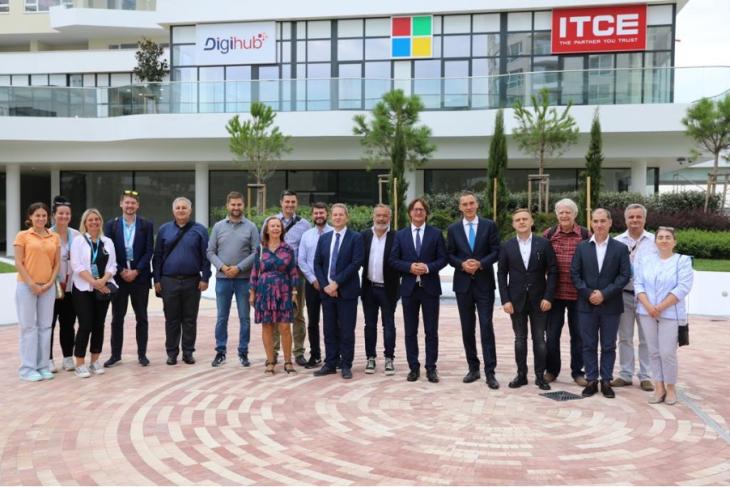Summary of the Clusters meet Regions event in Burgas
The European Cluster Collaboration Platform, on behalf of the European Commission and in partnership with Consulting Cluster Veritas and ICT Cluster Burgas, supported by the Bulgarian Small and Medium Enterprises Promotional Agency, the Municipality of Burgas, EEN Bulgaria and Cluster Mechatronik & Automation, jointly organised the “Clusters meet Regions” workshop on 13-15 September 2023 in Burgas, Bulgaria.
Themed “Enhancing cross-sectorial and trans-regional cooperation”, the Clusters meet Regions event in Burgas was the ninth event of the series. It focused on the priorities established by the region, such as tourism, ICT and creative industries, but also represented an opportunity to get a detailed overview of the local cluster panorama.
Day 1 (13 September) of the Clusters meet Regions event in Burgas began with 2 high-level parallel events from the DIGITOUR Project and the ICT Greening Up Initiative.
Highlights from DIGITOUR high-level event:
The objective of the DIGITOUR high-level event was to share results and knowledge gained through the voucher 1 support scheme of the project, good practices and lessons learned, as well as to demonstrate the collaborations created (voucher 2 support scheme of the project).
By organising this high-level event, the DIGITOUR Consortium aimed to emphasise the importance of the tourism industry and how transnational and cross-sectoral collaboration can help to find novel solutions for efficient and sustainable management, the development of new products and services (which are key to sustainability), and the marketing of tourism offers towards the needs of target customers.
The key message from Antonio Novo Guerrero, president of cluster IDiA (a member of the DIGITOUR consortium) from the opening session was: "In the heart of digitalisation lies the spirit of collaboration".
Participants of the DIGITOUR high-level event discussed the importance of the usage of AI chatbots in the hospitality sector and were given an example of best practice by Elitza Stoilova, the CEO of Umni, a company providing smart digital assistant solutions for hotels and accommodation providers to solve various challenges.
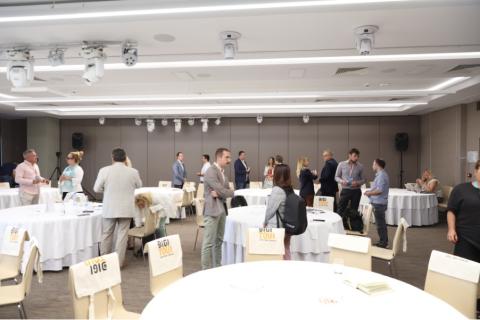
The session ended with all attendees sharing their thoughts and the inspiring ideas gained throughout the conversations. Most of the participants highlighted the importance of finding a common language between digital product providers and tourism suppliers. The second half of the day started with the presentations of the DIGITOUR Voucher 2 beneficiaries, introducing their collaborative projects to the audience. Projects from Italy, the Czech Republic, Bulgaria, France, Spain and Serbia were introduced in person and remotely.
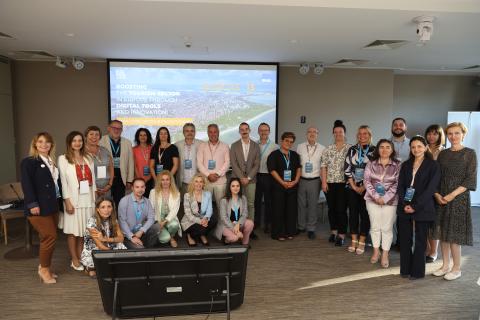
The final panel discussion of the day was dedicated to sustainable solutions and models currently used in the tourism industry. The moderator, Gorazd Cad from Toleranza Marketing, Slovenia, shared his view on modern sustainability strategies and increasing cases of 'greenwashing' across the industry. He asked the audience: "To estimate tourism growth, should we measure tourist arrivals and overnight stays, or should we measure degrowth?". At the end of his session, he also concluded: “Today, there were two clusters of words used throughout the sessions: 1) Innovation, digitalisation, sustainability, strategy and clusters and 2) Consortium, SMEs, EU Projects, tourism, tools and apps. The combination of these words fully describes the work behind not only the DIGITOUR project but also what stands behind collaboration and shared views”.
ICT GREENING UP Initiative high-level event highlights:
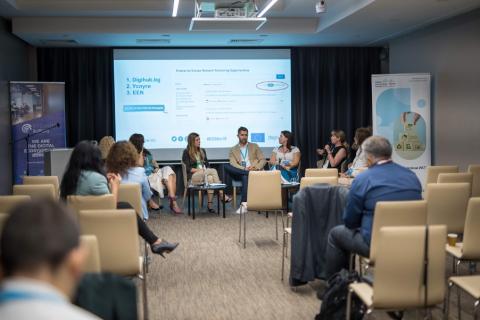
The ICT Greening Up initiative high-level event filled the conference room with energy and inspiration. The opening session, moderated by Petko Georgiev, Chairman of ICT Cluster Burgas, presented the "Initiative for greener ICT" project. The presentations of the panellists Reneta Koleva, Deputy Minister of the Ministry of Environment and Water and Natalia Miteva, Deputy Minister of Education and Science, were highly engaging, and the special guest from Norway, Fredrik Siversen, left an exceptional impression with his remarks. Mr. Siversen is a Director of Strategy and Business Development at IKT Norge and an active participant in sustainability and technological innovation. He revealed important aspects of the Norwegian experience in the green transformation of the ICT sector, which added an international context to the discussion.
The discussion panel: "ICT companies in the transition to a circular economy - let's speed up the process", addressed how the Ministry of Environment and Water supports the transition of the economy, and more specifically the ICT sector, to a circular model of functioning.
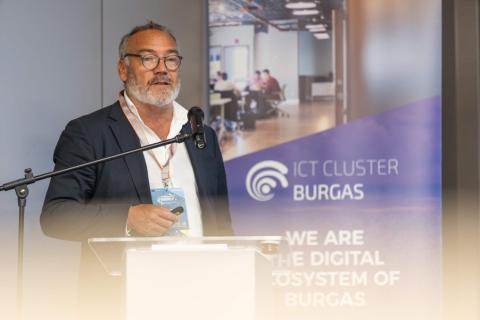
In the framework of the discussion panel titled "Accelerators of the green transformation of the ICT sector", Mrs Ina Agafanova, Representative of DIGIHUB and of the EEN network, outlined how DIGIHUB and the EEN network support the green transformation and the ICT sector.
The 9th edition of the Clusters meet Regions workshop on Day 2 (14 September) started with a welcoming speech by Mr. George Angelov, the Bulgarian Deputy Minister of Innovation and Growth, expressing his gratitude for being invited to the event and highlighting the importance of digitalisation and innovation for cluster development.
Highlights from the opening remarks:
Mr. Marek Przeor, Team Leader Cluster Policy of DG GROW, European Commission stated that the regions of Europe where clusters are cooperating with public administrations are better developed in comparison to those that lack dialogue between these two sectors. Mr. Przeor addressed local and regional public administrations, inviting them to initiate and develop partnerships with cluster organisations. He also encouraged the delegates of Clusters meet Regions in Burgas to participate in 'EU Clusters Talks', the series of events organised to inform private businesses about EU funding opportunities. To conclude his speech, Mr. Przeor drove the attention of the audience towards 3 main economic challenges that exist nowadays: 1) shortages of skills, 2) inflation, and 3) unsatisfactory business conditions for SMEs, going on to invite joint efforts to overcome these challenges together.
Mrs. Vesna Baltina, Deputy Mayor of the Burgas Municipality, welcomed the delegates to Burgas and shared that Burgas has the biggest airport and the busiest port in Bulgaria, along with having the biggest oil refinery in the Balkans. Ms. Baltina mentioned that 43% of the territory of Burgas is protected by Natura 2000, the largest coordinated network of protected areas in the world.
Mr. Antonio Novo, President of the European Clusters Alliance (ECA), took the floor next and informed the delegates that the idea of creating ECA (European Clusters Alliance) was born in Bulgaria, back in 2018, in the frame of the TCI Network European Conference in Sofia. He shared his views on overcoming current challenges around cluster policies in the EU and concluded his speech with two proposed solutions for Bulgarian clusters. The first of these solutions was encouraging national authorities to build cluster policies and facilitate alignments between policies and business; and the second was encouraging private companies and businesses to build capacity and improve internal skills to make their business stronger.
Mr. George Angelov, the Deputy Minister of Innovation and Growth stated: "The priorities of our Ministry are rebranding Bulgaria as a destination for innovation and to stimulate entrepreneurship in the country. We are working on the laws for stimulating foreign investments to Bulgaria and I can say that this year we had the highest amount of foreign investments in Bulgaria in comparison with previous years".
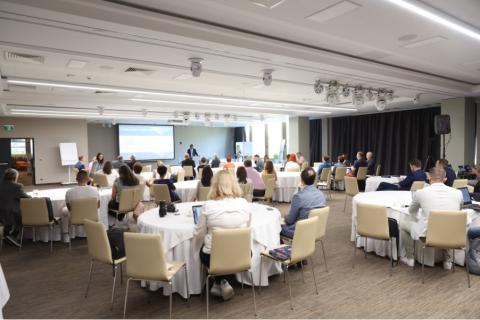 |
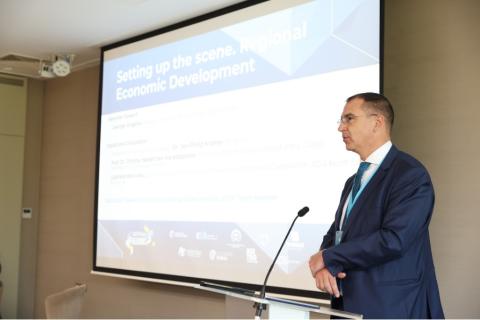 |
Following this was the panel discussion on Regional Economic Cooperation, which was joined by Mr. Nikolay Minkov, CEO of Cluster Srednogorie, Mr. Petko Georgiev, Chairman of the Board of DIGI HUB Burgas, Dr. Rosen Dimitrov, Chairman of the Board of the Digital Health and Innovations Cluster Bulgaria, Ms. Andreea Toma, Project manager of Transylvanian Furniture Cluster (Romania) and Mr. Georgi Penev, Managing Director of Bulgarian Fintech Association. Panellists discussed the implementation of innovation strategies within their organisations and agreed on the necessity to create an umbrella organisation for all 31 Bulgarian cluster organisations in order to stay connected, share knowledge and ideas and meet up on a regular basis. The moderator, Mr. Marek Przeor, summed up the panel with the conclusion that "innovation is happening across various sectors and industries".
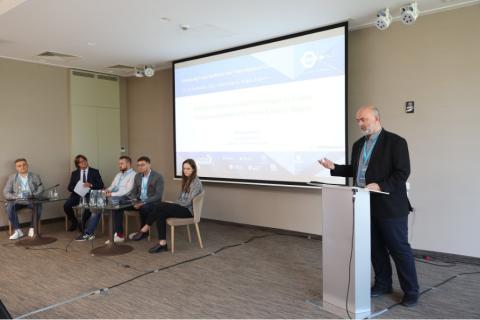
The day continued with a panel discussion on Cross-sectoral Cooperation. Mrs. Genoveva Christova-Murry, CEO of the Bulgarian Furniture Cluster and Creative HUB Bulgaria stated: "Creative industries in Bulgaria contribute 6.4% of the GDP of Bulgaria, whereas for the economy of Sofia, it is 11.2%, and the numbers are rising. When creativity meets technology, anything is possible."
Diving into examples of cross-sectorial cooperation, Mr. Petko Georgiev, from the ICT Cluster Burgas said: "This year we completed a VR project that was funded under the flagship programme and combines 50 objects of culture and the tourist sites of Nessebar. The digital platform that we created gives the opportunity for everyone to walk through the ancient town of Nessebar”. Petko shared information about the smart city Burgas platform that was created thanks to collaboration between the public sector and private stakeholders. The platform provides lots of useful and practical information to its users, such as the availability of parking slots in the city, etc. The platform is for open use and is available for download.
Next was another panel discussion, this time on the topic of "Successful stories and building for the future, learning more about the Bulgarian cluster landscape". This session was moderated by Daniela Chonkova, a cluster expert who engaged the panellists, addressing the question: "How do you support your companies with regard to green transmissions and digitalisation?"
Lubomir Stanislavov, CEO of Automotive Cluster Bulgaria, took the virtual floor and responded: "There are countries where private authorities support the purchase of electric cars and actually pay up to 11,000 euros for every electric car that is bought. We need to implement stimulating programmes like that in Bulgaria, as the absence of such programmes slows the development of green transmission in our country."
The next question that was asked: "How do you see the HR situation in the industry, what are the trends of employing new staff?" was answered by panellists as follows:
Mrs. Genoveva Christova-Murry: "I think in hospitality labour shifts to other industries or from smaller hotels to larger hotels. Digitalisation can help attract younger people/GEN Z to the industry. Large hotels are struggling in attracting skilled people, whereas smaller hotels are mostly family-run businesses, with less need to hire people than larger hotels."
Mrs. Kristina Eskenazi, Cluster Manager, Health & Lifescience Cluster and AI Cluster Bulgaria: "Health & Life Science Cluster Bulgaria is an organisation well-presented nationally, regionally and internationally. We are part of different Unions, dedicated to personalised medicine. I have to say that we in Eastern Europe are not as advanced when it comes to information and innovation in the health industry."
Mr. Vessein Vassilev, CEO, CASTRA – Bulgarian AeroSpace Cluster: "Bulgaria has two aerospace programmes implemented in 1979 and 1988. Bulgarian engineers are extremely talented, professor Tabakov of Bulgaria, the engineer of NASA developed the engine of the lunar module that landed on the Moon."
Towards the end of the day, the audience was engaged with presentations and invites from regions presenting themselves and their activities:
- Greece: Dr. Tanya Kyriakidou, D.E.P.A.N Cities Network, North Greece: "We need to design special offers and promotions for low tourist seasons in order to attract more tourists. This to include discounted offers and special programmes to motivate tourists to travel outside high-demand seasons." Tanya also mentioned that Greece is open to welcoming and supporting projects initiated by Bulgarian clusters.
- Kosovo: Arieta Pozhegu, Association of Wood Processors of Kosovo: "The Association of Wood Processors of Kosovo was established in 2004 with the aim to promote wood products from Kosovo to the world. As an Association, we support our members with participation in international fairs, business missions and meetings. We also offer guidance to Kosovan manufacturers to be competitive both internationally and locally."
- Loic Marin from France invited the delegates to join the upcoming Clusters meet Regions event in Lyon that will happen on 12-13 October. He informed participants that the umbrella topic of the France edition will be 'the industry of the future and the green and digital transition'.
- Renáta Pfefferová from the Czech Cluster Association shared information about the National Cluster Association of the Czech Republic and invited the delegates to join the Clusters meet Regions in Prague, which will happen between 22 and 24 October. She mentioned that the main reason to join the upcoming Clusters meet Regions in Prague is to hear expert insights and participate in match-making sessions that will be available for on-site delegates, as well as for online attendees.
- Mona Neubaur, the Minister of Economic Affairs and Climate Action of the State of North Rhine-Westphalia, introduced her region and mentioned that "challenges can be faced with innovation. What we need is cross-sectoral cooperation within Europe." Mona invited attendees to join the Clusters meet Regions event in Dusseldorf on 8-9 November and highlighted that the event will address the ongoing transformations and role of clusters in this process.
- Daniel Cosnita, CEO of CLUSTERO, promoted the upcoming Clusters meet Regions event in Romania (21-23 Nov), to learn more about Romanian clusters and to join the regional dialogue on cluster development tools.
Wrap-up and closing of the day
The Clusters meet Regions event in Burgas ended with closing remarks by the moderator and leader of the local host alliance Teodora Jilkova: "I am honoured to have this chance to welcome you all to Burgas, Bulgaria. I hope you had a chance to learn more about Bulgarian clusters and opportunities to grow together."
She was joined by Marek Przeor, who stated that he was positively impressed by the country’s cluster presentations. He added that he came to Bulgaria sceptical, as he had not known much about the Bulgarian cluster landscape, due to the less strong representation of the country’s clusters on the EU level. He encouraged the local delegates to be more active in order not to waste the great potential and resources that Bulgaria has to offer. He called Bulgarian clusters to organise themselves in the Bulgarian Cluster Alliance, as clusters do in other countries, and asked Bulgarian public authorities to support this process.
Marek Przeor: "I hope this meeting encourages Bulgarian Clusters and Cluster organisations to become more active, and you will see the EU clusters as your partners and supporters."
The event turned out to be a platform to discover the Black Sea region of Bulgaria and the city of Burgas, to connect different international players and to create new plans and opportunities.
The event gathered over 80 participants in Burgas. On site, there were participants from the following countries: Azerbaijan, Czechia, Kosovo, Lithuania, Romania, Serbia, Slovenia and Spain.
In addition, online we had attendees from Ukraine, Moldova, Georgia, Greece and France.
DAY 3: 15 September, Site Visits
The site visits, as part of the official Clusters Meet Regions programme in Burgas, started with a presentation of the activities of the Burgas Free University. Welcomed by Prof. Dr. Milen Baltov, delegates had the opportunity to see a drone actively used for seabed exploration.
A touching moment was the visit of students, winners of this year’s competition for student scientific creativity (as part of the social Lab programme of the university). They received their certificates from Marek Przeor and Prof. Baltov.
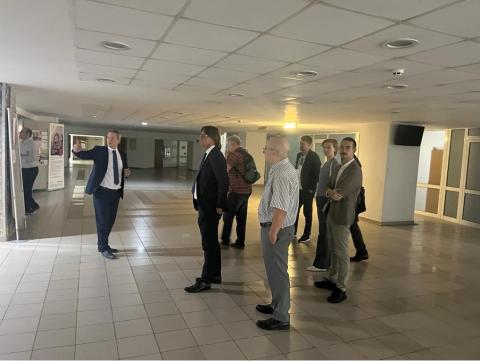 |
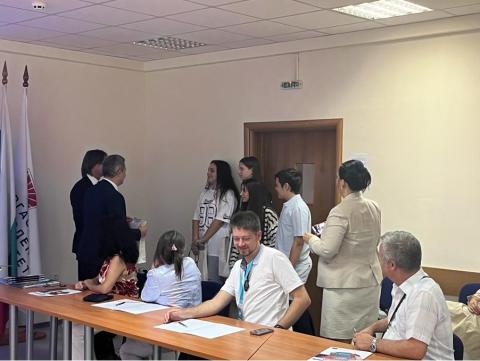 |
The second site visit was to the "Dr. Asen Zlatarov" University. The highlight here was the introduction of the ICT Centre of Excellence and its Labs.
The final visit was to Southeast Digital Innovation Hub's headquarters, where participants were introduced to its Smart City Lab. Burgas mayor Dimitar Nikolov joined the delegation and explained the priorities of the city in line with DigiHub expansion.
Check out the photos from the event on the ECCP's Flickr.
Learn more about Clusters meet Regions events and sign up for our upcoming editions now!
